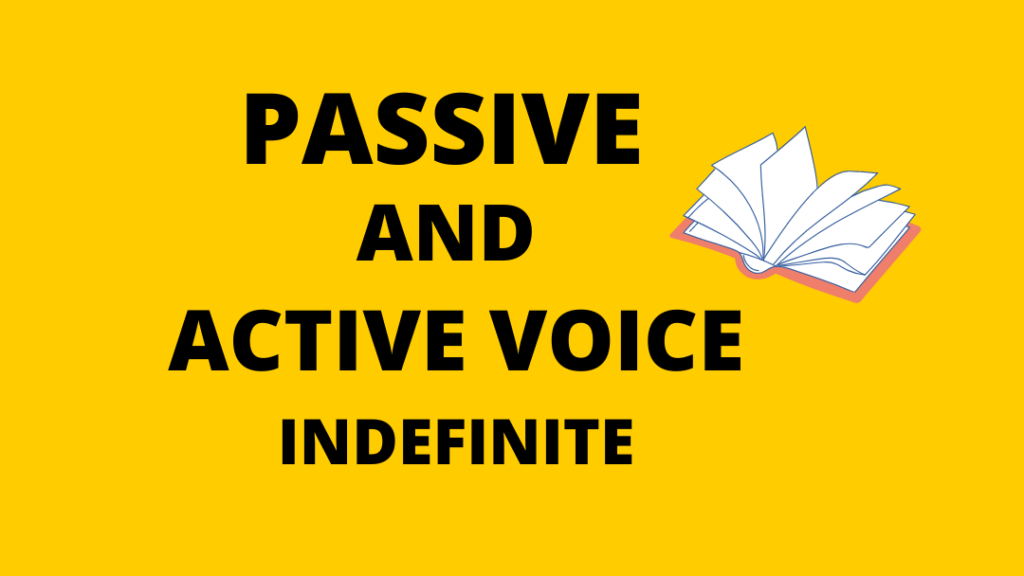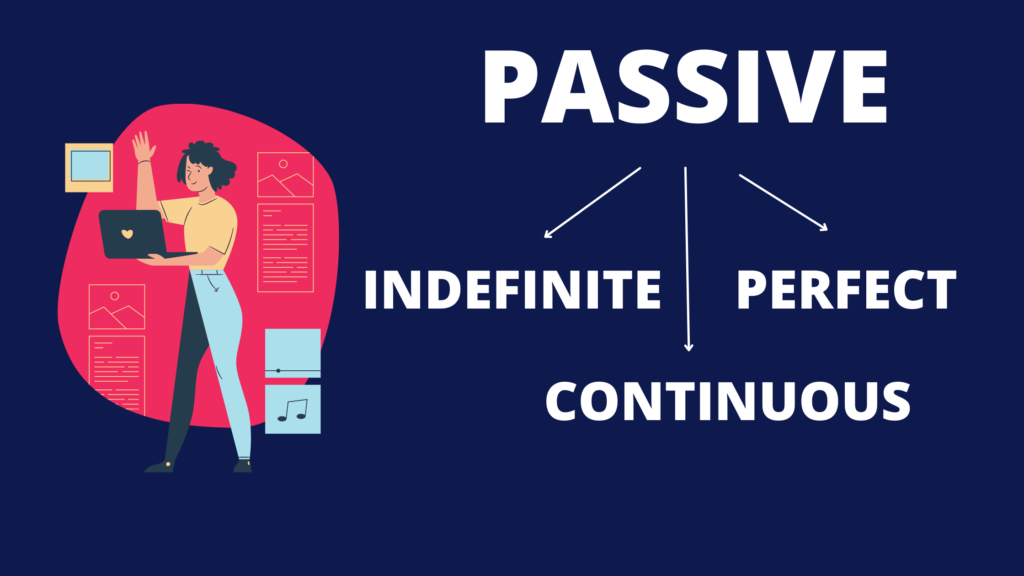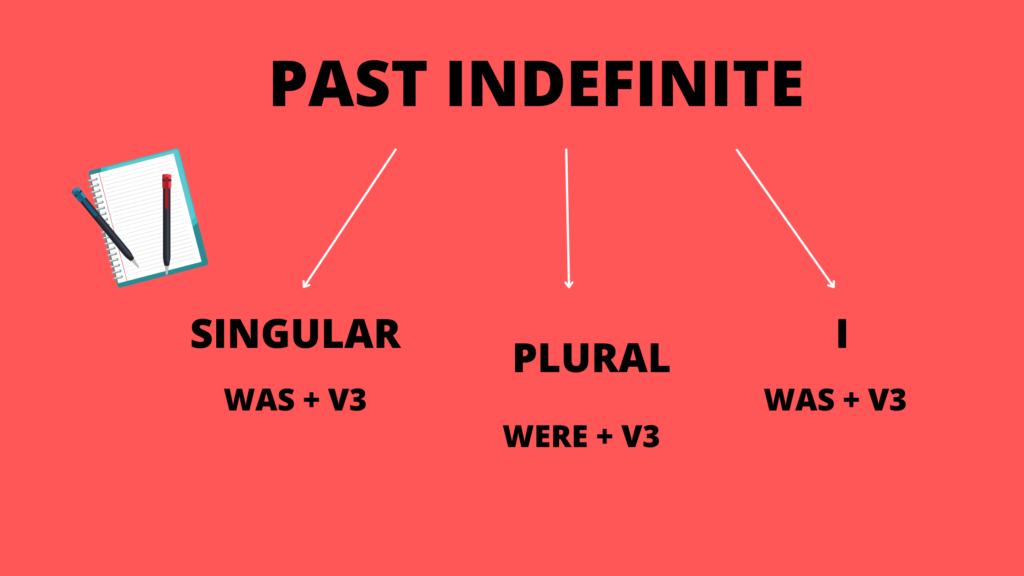
PASSIVE and ACTIVE VOICE (INDEFINITE) PART-1

INTRODUCTION
First, before going further, learn what is TENSE. Furthermore, This blog is about PASSIVE and ACTIVE VOICE (INDEFINITE). In addition to this, The concept of VOICE in English is a method that we use to refer to time -PAST, PRESENT, and FUTURE.
Moreover, VOICE can help you to have advanced and good communication with others. Besides, you must know that there are FOUR types of TENSE/ACTIVE VOICE:-
- INDEFINITE
2. CONTINUOUS
3. PERFECT
4. PERFECT CONTINUOUS
An additional, in PASSIVE VOICE we have THREE types:-

Moreover, Today we going to learn about the first INDEFINITE PASSIVE in a very simple way.
In general, the active voice makes your writing stronger, more direct, and, more active. However, The subject is something, or it does the action of the verb in the sentence. In addition to this, in the passive voice, the subject is acted upon by some other performer of the verb. Basically, (In case you weren’t paying attention, the previous two sentences use the type of voice they describe.)
PASSIVE and ACTIVE VOICE INDEFINITE (PRESENT POSITIVE)
Furthermore, The PRESENT INDEFINITE PASSIVE is all about your DAILY ROUTINE, LIKES/DISLIKES, also UNIVERSAL TRUTH.
Not only, you have to use IS+V3 with the SINGULAR SUBJECTS such as HE, SHE, IT, and ONE NAME like (Neeta), but also ARE+V3 with PLURAL SUBJECTS such as I, WE, YOU, THEY, and NAMES (TWO OR MORE THAN TWO), Moreover, AM+V3 with I subject. Furthermore, If we want to say who or what performs the action while using the passive voice, we use the preposition (BY). Consequently, When we know who performed the action and are interested in him, it is always better to switch to the active voice instead.

FOR EXAMPLE:-
DAILY ROUTINE (SINGULAR)– 1. (positive) Neeta takes bath. (ACTIVE)
- (P) The Shower is taken by Neeta. (PASSIVE)
2. (P) Ravi pays electricity bill. (ACTIVE)
2. (P) Electricity bill is paid by Ravi. (PASSIVE)
3. (P) She waters the plant. (ACTIVE)
3. (P) The plant is watered by her. (PASSIVE)
(PLURAL) – 1. (P) Meena and Ravina celebrate festivals. (ACTIVE)
- (P ) Festivals are celebrated by Meena and Ravina. (PASSIVE)
2. (P) They request you. (ACTIVE)
2. (P) You are requested by them. (PASSIVE)
3. (P) My mother loves me. (ACTIVE)
3. (P) I am loved. (PASSIVE)
Additionally, In PASSIVE the work and object are more important than the subject. Furthermore, we use an object or work at the beginning of the sentence and add a subject at the end with BY.
PASSIVE and ACTIVE VOICE INDEFINITE (PRESENT NEGATIVE)
Similarly, you can make negative by adding NOT after IS/AM/ARE.
FOR EXAMPLE:-
DAILY ROUTINE – (SINGULAR) 1. (negative) The Shower is not taken by Neeta.
2. (N) The Electricity bill is not paid by Ravi.
3. (N) The plant is not watered by her.
(PLURAL) – 1. (N) Festivals are not celebrated by Meena and Ravina.
2. (N) You are not requested by them.
3. (N) I am not loved.
PASSIVE and ACTIVE VOICE INDEFINITE (PRESENT INTERROGATIVE)
In addition, you can simply make INTERROGATIVE SENTENCES by putting their helping verbs in the beginning.
FOR EXAMPLE:-
DAILY ROUTINE – (SINGULAR)1. (interrogative) Is the shower taken by Neeta?
2. (I) Is the electricity bill paid by Ravi?
3. (I) Is the plant watered by her?
(PLURAL) – 1. (I) Are festivals celebrated by Meena and Ravina?
2. (I) Are you requested by them?
3. (I) Am I loved?
PASSIVE and ACTIVE VOICE INDEFINITE (PRESENT INTERROGATIVE NEGATIVE)
FOR EXAMPLE:-
DAILY ROUTINE – (SINGULAR)1. (Interrogative Negative) Is not the shower taken by Neeta?
2. (IN) Is not the electricity bill paid by Ravi?
3. (IN) Is not the plant watered by her?
(PLURAL) – 1. (IN) Are not festivals celebrated by Meena and Ravina?
2. (IN) Are not you requested by them?
3. (IN) Am not I loved?
PAST INDEFINITE PASSIVE (POSITIVE)
Furthermore, In PAST INDEFINITE you have to use WAS with SINGULAR and WERE with PLURAL.

FOR EXAMPLE:-
DAILY ROUTINE – (SINGULAR) 1. (P) The Shower was taken by Neeta.
2. (P) The Electricity bill was paid by Ravi.
3. (P) The plant was watered by her.
(PLURAL) – 1. (P) Festivals were celebrated by Meena and Ravina.
2. (P) You were requested by them.
3. (P) I was loved.
PAST INDEFINITE TENSE (NEGATIVE, INTERROGATIVE AND INTERROGATIVE NEGATIVE)
Similarly, you have to write NOT after WAS/WERE, in INTERROGATIVE and INTERROGATIVE NEGATIVE helping verb will come in the beginning.
FOR EXAMPLE:-
DAILY ROUTINE – (SINGULAR) 1. (N) The Shower was not taken by Neeta.
1. (I) Was the shower taken by Neeta?
1. (IN) Was not the shower taken by Neeta?
2. (N) The electricity bill was not paid by Ravi.
2. (I) Was the electricity bill paid by Ravi?
2. (IN) Was not the electricity bill paid by Ravi?
(PLURAL) – 1. (N) Festivals were not celebrated by Meena and Ravina.
1. (I) were festivals celebrated by Meena and Ravina?
1. (IN) Were not festivals celebrated by Meena and Ravina?
2. (N) I was not loved.
2. (I) Was I loved?
2. (IN) Was not I loved?
FUTURE INDEFINITE TENSE (POSITIVE, NEGATIVE, INTERROGATIVE AND INTERROGATIVE NEGATIVE)
Moreover, in the future of indefinite you have to use WILL+v3 with both (singular + plural).

FOR EXAMPLE:-
DAILY ROUTINE – (SINGULAR) 1. (P) The Shower will be taken by Neeta.
1. (N) The Shower will not be taken by Neeta.
1. (I) Will the shower be taken by Neeta?
1. (IN) Will not the shower be taken by Neeta?
2. (P) The electricity bill will be paid by Ravi.
2. (N) The electricity bill will not be paid by Ravi.
2. (I) Will the electricity bill be paid by Ravi?
2. (IN) Will not the electricity bill be paid by Ravi?
(PLURAL) – (P) Festivals will be celebrated by Meena and Ravina.
1. (N) Festivals will not be celebrated by Meena and Ravina.
1. (I) Will festivals be celebrated by Meena and Ravina?
1. (IN) Will not festivals be celebrated by Meena and Ravina?
2. (P) I will be loved.
2. (N) I will not be loved.
2. (I) Will I be loved?
2. (IN) Will not I be loved?
In conclusion, always remember that we never use WILL BE together in Negative, Interrogative, and Interrogative negative. Moreover, In Negative you have to use not in between of will be, whereas Interrogative and Interrogative will use subject in between of will be.
I hope, you are enjoying the blogs, please do share with others as well.
[…] before going further, learn passive and active voice part -1. Furthermore, This blog is about ACTIVE VOICE and PASSIVE VOICE (CONTINUOUS) In addition to this, […]
[…] before going further, learn passive and active voice part -1. Furthermore, This blog is about ACTIVE and PASSIVE VOICE RULES (PERFECT) In addition to this, The […]
That is very fascinating, You are an overly skilled blogger. I’ve joined your rss feed and look forward to in search of more of your wonderful post. Also, I have shared your web site in my social networks!
Thanks for your article. It is quite unfortunate that over the last 10 years, the travel industry has had to fight terrorism, SARS, tsunamis, bird flu, swine flu, as well as the first ever true global economic depression. Through everthing the industry has proven to be effective, resilient along with dynamic, locating new ways to deal with hardship. There are often fresh challenges and opportunity to which the sector must once again adapt and behave.